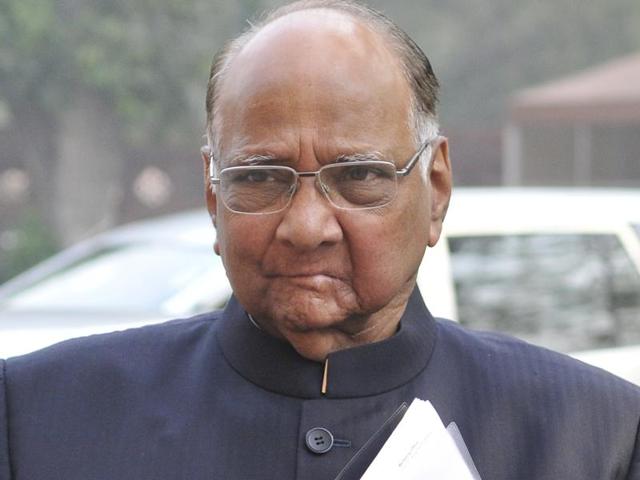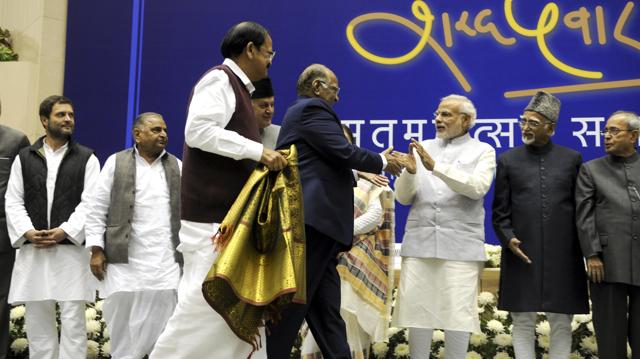The accumulation of Pawar: Sharad Pawar and his political journey
Sharad Pawar’s ability to build relationships across party lines has made him one of India’s toughest politicians. It also ensured that every powerful tycoon and political figure attended his seventy-fifth birthday celebrations, which were, in effect, the launch of his campaign for the presidency
In the year of India’s independence, picture a little boy in white shirt and khaki half-pants at a dusty village school in Katewadi in Maharashtra. It is the young Sharad Pawar, who has exceeded the allotted minutes in an elocution competition. Ignoring his teacher, Mr Waghmore, he keeps on talking. Finally, sir has to grab his collar and force him to sit down.

A decade or so later, now a first-year student at Brihan Maharashtra Commerce College in Pune, Pawar is honing the political techniques that will later stand him in good stead. His batch mate Vithal Maniar remembers: “We had to elect a class representative. We were all from business families, and thought this boy from the village could not compete with us. He was meticulous, going to each of the 300 or so in the class and explaining what he could do for them. After he got 80 percent of the vote, he came to us and said let’s join together. Even with the political opposition, his personal relations are always good. People in other colleges [in Pune] were soon fighting their campaigns under the name of ‘Pawar Panel’. In 1962, at the time of the China War, he took a morcha of 20,000 students to Shaniwarwada fort.”
Sharad Pawar is one of India’s toughest and most deeply-entrenched politicians. His appearance is striking: he has a shiny head and a shrewd face; the left side of his mouth is pulled down, after an operation for oral cancer. He looks as if nothing would get past him. This week, he published a memoir titled On My Terms and celebrated his seventy-fifth birthday. It is hard to picture any other politician who could have persuaded business tycoons and major politicians (from the President to the Prime Minister to Dr Manmohan Singh, chief ministers and a brace of Gandhis) to attend his birthday party and praise him. The event was, in effect, the launch of Sharad Pawar’s campaign for the presidency. It was also a marker: if the Shiv Sena continues on its disruptive path, Pawar’s NCP could conceivably, in a year or two, tie up with the BJP.

Becoming chief minister of Maharashtra at the age of 37, Pawar was regarded in 1991 as the likely next Congress prime minister, only for the job to go to PV Narasimha Rao. In 1999, he moved against Sonia Gandhi over her ‘foreign origins’. “The people around her thought of me as a threat,” he tells me, deadpan, at his official residence in Janpath, New Delhi. “I was not expecting her to resign.” Pawar had misjudged the steeliness of the Congress president.
Read: Sharad Pawar, BJP and the guessing games
He broke away to form the Nationalist Congress Party, but five years later realigned with Congress and took over the departments of Agriculture, Consumer Affairs, Food and Public Distribution. 2004 was quite a year for Pawar: “I had to remove a sizeable number of my teeth and some of my cheek after the cancer diagnosis. They took a skin graft from my leg and put it inside my mouth. I still campaigned in the general election, and we won. After I became a minister, I had to go for 32 days of chemotherapy, which burnt up my lips and tongue. Each day I would start work at 9am, and at 3pm I would go to the hospital. It’s a battle. Either you succeed, or you lose everything.”
Sharad Pawar was one of 11 children: four girls and seven boys. Their father grew sugar cane, bananas and grapes, and was a member of the Peasants and Workers Party. “But I was attracted to Gandhi and Nehru,” he says. “My mother was my biggest influence. She was a social reformer and joined electoral politics in 1937, and was the only woman to be elected to the local board.” Under Bai’s orders, the children got an education. Each day, she would send a large tiffin from Baramati to Pune in the care of the conductor of the ST bus. “It might be bajra roti or bhakri, and one subji like potato or peas or lady’s finger,” remembers Pawar’s old college friend Vithal Maniar, who is today a director of Lavasa. “The brothers who were studying in the city would go in rotation to the bus stand to collect the dabba.”
Despite his long journey from his roots, Pawar remains obsessed with farming and likes to talk about subjects like agricultural processing, fruit juice extraction or the use of GM to increase disease resistance in crops. He became a protégé of the chief minister, Yashwantrao Chavan. Even today, says an associate, “He knows every block, every ward in Maharashtra. He can stop his car in a village anywhere in the state, and will know the names of two-three families.”
Read: How Sharad Pawar landed in trouble over Dawood
His ability to build a personal equation extended across an unexpected range of politicians: Chandrashekhar, Manmohan Singh, Lalu Yadav, Narendra Modi, even his long-time opponent, Bal Thackeray. “I didn’t like Balasaheb’s political approach,” he says, “because it was not broad, but he was an excellent friend. And he would do anything for a friend.”
Did he get along with Rajiv Gandhi, who in 1990 instigated a revolt against his leadership in Maharashtra? “Some ministers resigned. There were six days of tamasha, and one fine morning I got a call from Delhi that I should come and see Rajiv. ‘What’s happening?’ he asked me. I looked at him and said, ‘Why are you asking? They acted on your instructions and couldn’t muster support.’ He said: ‘I told them to shake the tree, not uproot the tree.’ We put it aside and campaigned together in the next election. Rajiv stayed at my home in Mumbai, and my last conversation with him was at about 3.30 am. After that he went to the south, and was assassinated.”
When I mention that I am writing on Pawar, a senior banker in Mumbai says to me: “He is supposed to be the richest man in India.” But is that true? “No. But he’s richer than he says he is.” When I ask Pawar himself about claims of corruption, he answers with Teflon ease: “Some people have raised this issue, but nothing is there. I’m not a very rich person. Myself and my wife, we have very limited demands. What I spend, I spend on books and travelling.”
His motivating force appears to be the accumulation of power. Even as a student leader in Pune, he was elected as an inter-collegiate sports representative, giving him local patronage and influence. He has fingers in many pies. As well as being an MP and running the NCP, he has been involved in educational institutions, property development, the administration of sports like kabaddi and kho-kho, and was the powerful president of the Board of Control for Cricket and the International Cricket Council. His daughter Supriya Sule is one of his party’s MPs. “I like to head things,” he says candidly.
Although Pawar came from a left-wing background in drought-ridden rural Maharashtra, he was an early supporter of market reforms. In 1979, he tried unsuccessfully to persuade Morarji Desai to allow the private sector to generate power. As a young man, he travelled the world on a UNESCO scholarship and worked in the offices of the Japanese prime minister and of Bobby Kennedy, the senator from New York and brother of the recently deceased US president. He observed closely “their methods of functioning, of making notes, of handling the media, of scheduling meetings.”
Pawar is used to pressure. “When the Bombay blasts happened in 1993, after Babri Masjid, I was worried there would be riots. The blasts took place in Hindu-dominated localities, so I went on television and said one more had exploded at Masjid Bunder, in a Muslim area. That was not true,” he admits. A senior civil servant, Balkumar Agarwal, remembers being at a meeting with the chief minister on the morning after the blasts. “A car bomb had exploded beneath the Bombay Stock Exchange, and we needed a cable to reconnect the exchange to the telephone system. So Sharad Pawar asked: ‘Is there any such cable in India?’ There was only one, in Delhi. He picked up the phone and had the cable put on a plane. He always knows the right person to call. On Monday morning, the milk vans and buses were plying, factories were open and Dalal Street was trading. It was a message to the world: All is fine and business is on.”
Does Sharad Pawar want to be president of India? He smiles. “I don’t think in that direction.”
Pawar answers some straight & personal questions:
What law would you change in India?
I would introduce corrective measures in the justice system. It is not working for many people, especially for women.
If you weren’t a politician, what would you do?
I’d be a farmer, or working in an industry that does agricultural processing.
Which historical figures do you admire?
Pandit Jawaharlal Nehru, Yashwantrao Chavan, Albert Einstein, for his original thinking.
What books are you reading?
I am reading India Wins Freedom by Maulana Azad. I’ve read it many times.
What keeps you awake at night?
Preparing for work the next day. A person who is in public life has a commitment every single day.
Which contemporary politicians do you admire?
(Thinks) Praful Patel understands politics and is committed to his party work. He’s a good administrator. Youngsters like Jitin Prasada are doing well now.
What movies do you watch?
I don’t see so many. I like Satyajit Ray.
What music do you listen to?
Classical music. Marathi and Hindi music.
Do you believe in God?
No, but I do go to temples. I go to them so as to respect the beliefs of others, like my colleagues and my party workers. They’re honest people, and if it makes them happy for me to come to a temple or to go and see the sculpture of a saint, I will go.
What is the worst experience of your life?
When my mother passed away in 1974. She is the person who built up my family





